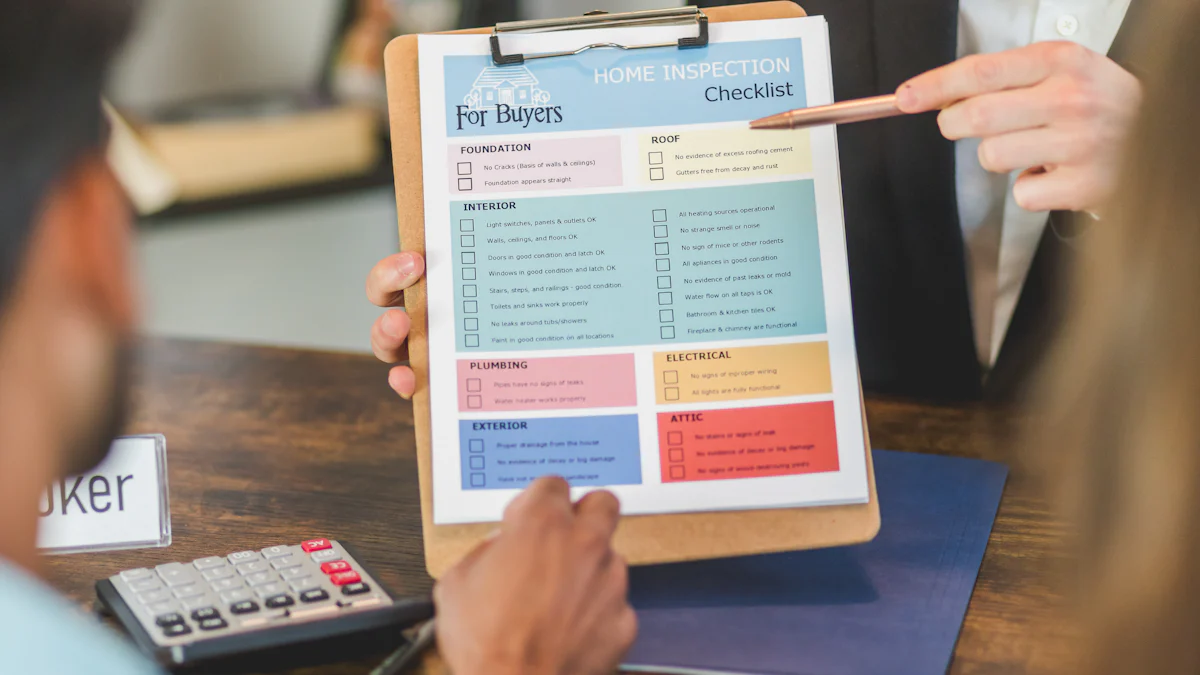What Is a Home Inspection and How Does It Protect You?

When buying or selling a home, knowing its condition is key. A home inspection is a professional check of the property that is essential in the home services industry. It helps find problems before they get worse. A study by the National Association of Realtors® and the American Society of Home Inspectors shows that 77% of U.S. homebuyers get a home inspection before buying. This step helps you understand your investment and avoid surprises.
Inspections often find roof leaks, old electrical systems, or plumbing issues. These problems can be unsafe and expensive to fix. Finding them early protects your money and keeps the home safe. Whether buying or selling, a home inspection provides you with confidence and peace of mind in your home services journey.
Key Takeaways
A home inspection shows hidden issues in a house. This helps you avoid expensive repairs later.
Safety is important; inspections find dangers like bad wiring or leaks that could hurt your family.
A home inspection builds trust in buying or selling homes. It helps both buyers and sellers stay informed.
Pick a skilled inspector and go to the inspection. Ask questions and learn about the home's condition.
Use the report to ask for repairs or lower the price. This saves money and helps plan future fixes.
The Importance of Home Inspections
Finding Hidden Problems
A home inspection helps find issues you might not notice. Inspectors often spot things like bad wiring, leaks, or weak structures. These problems can harm the home and cost a lot to fix. For example, replacing old pipes can cost $2,000 to $15,000, depending on the home’s size. Catching these issues early lets you fix them before they get worse. Skipping an inspection might leave you with big repair bills or safety risks. Buyers can also use the report to ask for repairs or lower the price, making the deal fair.
Keeping the Home Safe
Safety is a major concern during home inspections. Inspectors often find dangers like poor drainage, old roofs, or broken heaters. These problems can make a home unsafe to live in. For example, bad ventilation can trap moisture and harmful gases, while faulty wiring can cause fires. Fixing these issues makes the home safe for your family. Inspections also protect you from legal or money troubles. For instance, illegal home changes found during an inspection can cause insurance or tax problems. Knowing these risks helps you make smart choices about the home.
Saving Money on Repairs
A home inspection helps you save money by spotting problems early. Fixing a small roof issue might cost under $1,500, but replacing the whole roof could cost over $30,000. Fixing a leaky faucet early might cost less than $450, but ignoring it could lead to $1,500 in water damage. On average, inspections save $2,000 to $6,000 on drainage repairs alone. Buyers avoid surprise costs after moving in, and sellers can fix small issues to attract buyers. A home inspection gives financial security and peace of mind, helping you avoid future problems.
Building Confidence in Real Estate Deals
A home inspection helps build trust when buying or selling a home. It gives a clear report about the home’s condition. This report helps everyone understand the home’s true value. It also prevents surprises and makes the deal feel fair.
For buyers, inspections show exactly what they are getting. This reduces worries about hidden problems. Sellers benefit too because it shows they are honest. This honesty makes talks easier and builds trust between both sides. For example, if small repairs are needed, they can be discussed calmly. This avoids surprise costs later.
Home inspections do more than find problems. They help with fair negotiations. Buyers can ask for repairs or lower the price. Sellers can fix issues early to avoid concerns. This makes the final deal match the home’s real value. When both sides feel informed, the process is less stressful.
Being open is key to building trust. A home inspection clears doubts and helps you decide wisely. Whether buying your first home or selling one, this step ensures fairness. It protects your money and gives peace of mind.
The Home Inspection Process
What Does a Home Inspection Include?
A home inspection is a careful check of the property. It helps you learn about the home’s condition before deciding. Here are the main areas inspectors review:
Structural Components: Inspectors look at the foundation, walls, and roof. They check for cracks, damage, or wear. A solid structure keeps the home safe.
Electrical Systems: They inspect the wiring, outlets, and electrical panel. Old or exposed wires can be dangerous.
Plumbing Systems: Inspectors check for leaks, water pressure, and pipe condition. Rusty or broken pipes can cost a lot to fix.
HVAC Systems: Heating and cooling systems are tested for proper working order. A broken HVAC can raise energy bills and lower comfort.
Additional Areas: Inspectors also check the attic, basement, kitchen, and bathrooms. They note problems like pests, bad insulation, or broken appliances.
What Are the Limitations of a Home Inspection?
Even though inspections are detailed, they have limits.
Cosmetic Issues and Hidden Problems
Inspectors focus on big issues and safety risks. Small flaws, like chipped paint, may not be included. Hidden problems, like mold inside walls, might not be found without special tests.
Difference Between a Home Inspection and an Appraisal
A home inspection checks the home’s condition. An appraisal looks at its market value. Inspectors focus on safety and repairs, while appraisers check location and prices of similar homes.
Steps to Take If Problems Are Found
If major problems are found, you can:
Ask contractors for repair estimates.
Request the seller to give credits for repairs.
Add clauses to the deal to protect yourself.
Knowing how inspections work helps you make smart choices and avoid surprises.
Getting Ready for a Home Inspection
Advice for Buyers
Picking the Right Inspector
Choosing a good home inspector is very important. Look for someone with lots of experience. Check their licenses with local or state offices. Ask for examples of past reports to see their work. A great inspector explains problems in simple terms. Talk to them to check their skills and ask about their training. A skilled inspector gives a fair review of the home. They check the structure, wiring, plumbing, and heating systems.
Being Present at the Inspection
Going to the inspection has many advantages. You can talk directly to the inspector and ask questions. Seeing problems in person helps you understand them better. Walking through the home teaches you about its care and upkeep. This knowledge can save you money later. Being there also makes you feel more confident about your choice. It can help you negotiate a better price too.
Advice for Sellers
Getting the Home Ready
Preparing your home for inspection makes things easier. Clean your home well and open windows for fresh air. Dust ceiling fans and clean vents. Make sure smoke alarms work and locks are secure. Clear paths to attics, basements, and electrical panels. Leave repair records or warranties where they’re easy to find. Remove pets and personal items to avoid distractions. These steps show buyers you’ve taken good care of the home.
Fixing Small Problems Early
Fixing small issues before the inspection can avoid problems later. Check for leaks or rusty pipes and call a plumber if needed. Have an electrician check for old or unsafe wiring. Look for roof damage or clogged gutters and fix them. Fill small cracks in walls or floors and repaint them. Fixing these things early makes buyers feel better about the home. It also helps the inspection go smoothly and leaves a good impression.
Understanding the Home Inspection Checklist and Report
A home inspection checklist ensures no important areas are missed. After the inspection, you’ll get a detailed report. This report explains the property’s condition clearly. It helps you make smart decisions.
Key Sections of the Report
The home inspection report has several main sections. Each section shows specific findings:
General Information: Includes property details, inspection date, and conditions that day.
Notated Images: Photos of issues with notes explaining the problems.
Detailed Assessments: Reviews systems like electrical, plumbing, HVAC, and structure.
Summary and Ratings: Gives an overview with ratings based on problem severity.
Inspectors also give details about major systems:
Electrical: Lists panel locations, wiring types, and smoke detector presence.
Plumbing: Describes pipes, water supply, and water heater condition.
HVAC: Notes the system’s age, working order, and condition.
Fireplaces: Checks fireplaces, stoves, or inserts for safety and function.
Interior Areas: Reviews walls, floors, ceilings, and appliances.
This breakdown helps you see the property’s strengths and weaknesses.
How to Use the Report
The inspection report is helpful for buyers and sellers. Using it wisely can save money and time.
Negotiating Repairs or Price Adjustments
Buyers can use the report to ask for repairs or lower prices. For example, if the HVAC system is broken, you can request repairs or a price cut. Sellers can prepare by reviewing the report and getting repair estimates. Sharing parts of the report during talks helps both sides agree fairly.
Planning Future Maintenance
The report is also useful for planning future repairs. It shows areas needing attention later, like old plumbing or roof wear. Fixing these early avoids big repair costs. Use the checklist to plan maintenance and keep the property in good shape.
A good report helps with repair talks and long-term property care.
Getting a home inspection is a smart move when buying or selling. It keeps you safe, saves money, and gives peace of mind. Inspectors find problems early, so you know the home’s condition. This helps you make better and more confident choices.
A professional inspection also brings long-term money-saving benefits:
Benefit | Description |
|---|---|
Finds problems early, letting you ask for repairs or lower prices. | |
Maintenance Planning | Helps you plan repairs and budget wisely to avoid big costs later. |
Educational Value | Teaches you about your home, so you can take care of it and avoid surprises. |
By doing this, you save time, money, and stress. It also keeps your home safe and a good investment.
FAQ
How much does a home inspection cost?
A home inspection usually costs between $300 and $500. The price can change based on the home’s size, location, and age. Bigger or older homes might cost more because they take longer to inspect.
How long does a home inspection last?
Most home inspections take 2 to 4 hours to finish. The time depends on how big the home is and its condition. Larger homes or ones with more systems may take longer. Being there during the inspection helps you ask questions and learn more.
Should you skip a home inspection if the house looks good?
Skipping a home inspection is not a good idea. Even homes that seem fine can have hidden problems like bad wiring or leaks. An inspection helps you find these issues early, saving you from costly repairs or safety problems later.
Do home inspectors check for pests or mold?
Home inspectors might notice signs of pests or mold, but they don’t do special tests. For detailed checks, you’ll need experts in pest control or mold removal. If the inspector sees a problem, they’ll suggest calling a professional for help.
Is a home inspection required by law?
Home inspections are not required by law, but they are very important. Most lenders don’t make them mandatory, but inspections protect your money. Skipping one could lead to expensive repairs or safety risks. Always get an inspection to feel secure about your choice.
Tip: Always choose a licensed and skilled home inspector. Their knowledge ensures a complete check of the home, helping you make smart decisions.
See Also
Ensuring Your Home's Safety With Routine Pest Control
Essential Tips for Locating a Trustworthy Handyman
Key Considerations When Selecting Flooring Installation Experts
